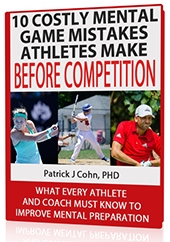
Some of the most common questions we receive from sports parents are:
“When should kids start a sports psychology coaching program?”
Does my child have to have a problem to start mental training for sports? How serious does my child have to be about sports to benefit from sports psychology?
First, not all young athletes can benefit from sports psychology or mental coaching. Some kids are not interested in doing mental training because they don’t understand it or they think it’s only for problem athletes.
Likewise, they might not be competitive athletes. Many athletes participate in sports for social reasons and are not motivated to improve their mental or physical skills, or have the need to.
Second, at Peak Performance Sports, we work primarily with competitive athletes who want to improve their performance.
We’ve worked with athletes as young as 8 years old. However, this is more rare than the norm. These athletes were competing nationally at the time.
At this age, we tend to work with athletes and parents equally.
We think it is important for parents to understand how to help their kids grow confidence and other mental skills for success.
We want parents to understand how they can influence their athletes’ mental toughness in sports.
We suggest the best age you should introduce sports psychology to young athletes is typically around 10 to 12 years old–depending on the athlete. Kids are mature enough at this age to understand the concepts we teach and why they are participating in a mental training program.
However, we suggest to parents that they introduce the idea and get their athlete’s commitment to mental training.
You want kids to engage in sports psychology coaching for the right reasons. For example, if they are forced to do it by a parent, they will not reap the benefits of mental coaching.
If they view sports psychology coaching as remedial or that it’s a sign they have something wrong with them, it’s less likely they will participate.
We find that kids who may not understand it, will simply avoid it.
When parents contact us about doing mental training with their kids, the first question we ask is:
Does your athlete want to do this and do they understand what sports psychology if for?
We help parents introduce the idea to their kids.
We give them a short mental toughness assessment and a short eBook to explain sport psychology and help kids embrace it.
It’s important for your athletes to be ready and receptive to sport psychology coaching.
Many parents do contact us already having discussed the idea of doing mental training. In this case, we ask to meet with young athletes for 15 minutes via phone or Skype to assess if they are a good fit for mental training.
This is an additional step we take to ensure your athlete is ready and willing to participate in a program. Unfortunately, we’ve had to turn down some parents as we felt it was not a good fit or the athlete was not ready for mental training.
If you’re interested in exploring mental coaching for your athlete, please contact us at Sports Psychology Coach and request our complementary one-page mental game assessment and to schedule a 15-minute introductory session. Here’s a related article: When Are Kids Ready for Sports Psychology?
Related Sports Psychology Articles:
- How To Manage Perfectionism In Sports
- Mental Imagery in Sports Psychology
- What Does it Mean to Be a Team Player?
Free Mental Toughness Reports

Get instant access to a mental game report to improve your mental toughness. Are you making one or more of these “deadly” mental game mistakes prior to competition? You can improve your mental game with one of our free sports-specific reports below.
with our free mental toughness reports, you’ll:
- Discover if you have positive or negative pregame jitters.
- Identify your pre-competition mental game mistakes.
- Learn the important pregame mental skills to boost your performance and success!
Learn how mental game strategies can boost your mental toughness in sports with Dr. Cohn’s free mental game reports!
